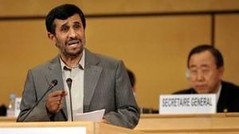
President Ahmadinejad of the Islamic Republic of Iran speaking at the World Conference Against Racism Durban Review II in Geneva. The racist states walked out during his address. The majority stayed and cheered his remarks.
Originally uploaded by Pan-African News Wire File Photos
Tue, Mar 30 2010
By Steve Holland and David Ljungren
WASHINGTON/GATINEAU, Quebec (Reuters) - U.S. President Barack Obama said on Tuesday he wanted tougher U.N. sanctions in weeks against Iran over its nuclear program, and the world's leading industrial nations expressed optimism that China will agree on possible next steps.
Obama and French President Nicolas Sarkozy presented a united front on Iran at a joint White House news conference, saying they felt it was time to move ahead with tougher sanctions that their governments have been negotiating with China, Russia, Germany and Britain.
"My hope is that we are going to get this done this spring," Obama said. "I'm interested in seeing that regime in place in weeks."
In Gatineau, foreign ministers from the Group of Eight nations urged the international community to take "appropriate and strong steps" to show its resolve over the nuclear program. They left the door open to diplomatic dialogue.
Western powers have wrestled for months over whether to impose a fourth round of sanctions on Iran, even as evidence has mounted raising doubts about whether Tehran is telling the truth when it says its nuclear program is only to produce peaceful atomic energy.
Particularly damning was a report in February from the U.N. nuclear watchdog, the International Atomic Energy Agency, that said Iran may be working to develop a nuclear-armed missile.
China, reluctant for months, is believed by diplomats to be slowly falling in line behind the idea of imposing new sanctions. Beijing's support is critical given that it has the power to veto any new sanctions resolution from the U.N. Security Council.
'DEMONSTRATE FLEXIBILITY'
In Beijing on Tuesday, a Chinese foreign ministry spokesman said his government opposed Iran acquiring nuclear weapons but stopped short of backing new sanctions.
"At present, we hope that all sides will make substantive efforts and demonstrate flexibility over the Iran nuclear issue," he said.
U.S. Secretary of State Hillary Clinton, saying sanctions were a part of diplomacy, said Iran had repeatedly shown an unwillingness to fulfill its international obligations over the last 15 months.
"That's the basis on which I express my optimism that we're going to have a consensus reached in the Security Council," she told a news conference after the meeting in Gatineau, Quebec, just outside Ottawa, ended.
Obama, however, injected a note of caution, saying that many countries believed their commercial interests with Iran are more important than long-term geopolitical interests.
"Now, do we have unanimity in the international community? Not yet. And that's something that we have to work on," he said.
'DOOR REMAINS OPEN'
In their final communique, the G8 ministers said they wanted Iran to comply with demands from the Security Council and cooperate with the International Atomic Energy Agency.
"Ministers agreed to remain open to dialogue and also reaffirmed the need to take appropriate and strong steps to demonstrate international resolve to uphold the international nuclear nonproliferation regime," the communique said.
In Washington, Sarkozy said "the time has come to take decisions" on Iran and that with German Chancellor Angela Merkel and British Prime Minister Gordon Brown, "we will make all necessary efforts to make sure that Europe as a whole engages in the sanctions regime."
Obama said the long-term consequences of a nuclear-armed Iran are unacceptable and that Tehran had so far rejected diplomatic entreaties.
"The door remains open if the Iranians choose to walk through it," he said.
The latest U.S.-drafted sanctions proposal would expand a U.N. blacklist to include members of the Islamic Revolutionary Guard Corps and firms controlled by it.
(Additional reporting by Andrew Quinn and Randall Palmer in Gatineau and Patricia Zengerle in Washington; editing by Xavier Briand)
No comments:
Post a Comment